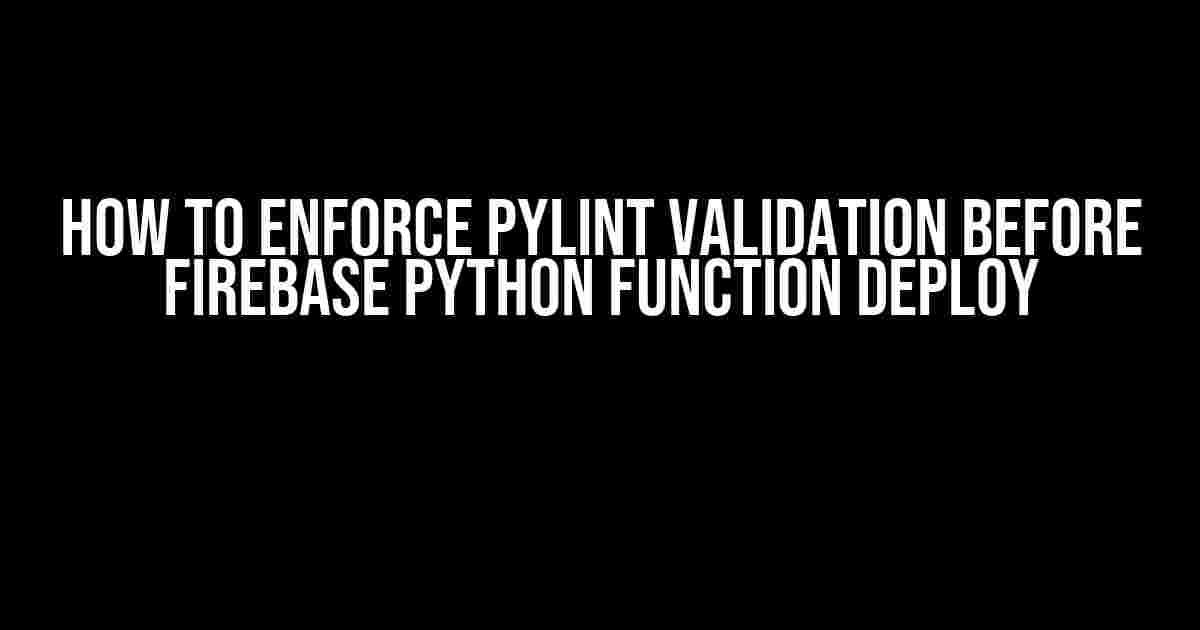Are you tired of deploying Python functions to Firebase only to find out that they’re riddled with errors and bugs? Do you wish there was a way to ensure that your code meets the highest standards of quality and readability before deploying it to the cloud? Look no further! In this article, we’ll show you how to enforce Pylint validation before deploying your Python functions to Firebase.
What is Pylint?
Pylint is a powerful tool that analyzes your Python code for errors, bugs, and quality issues. It’s a static code analyzer that checks your code for compliance with Python’s best practices, identifies potential security vulnerabilities, and provides suggestions for improvement. By integrating Pylint into your development workflow, you can ensure that your code is robust, efficient, and easy to maintain.
Why Enforce Pylint Validation Before Deploying to Firebase?
Deploying Python functions to Firebase without proper validation can lead to a range of issues, including:
- Errors and bugs that can cause your function to fail or behave erratically
- Performance bottlenecks that can slow down your function’s execution
- Security vulnerabilities that can put your users’ data at risk
- Code that’s difficult to maintain, update, or scale
By enforcing Pylint validation before deploying to Firebase, you can catch and fix these issues early on, ensuring that your code is reliable, efficient, and secure.
Step 1: Install Pylint and Configure Your Project
To get started, you’ll need to install Pylint using pip:
pip install pylintNext, create a new file called `pylintrc` in the root of your project directory. This file will contain your Pylint configuration settings. Add the following code to get started:
[MASTER]
# Specify the Python version to use
python_version = 3.7
# Specify the directories to analyze
recursive = yes
files = *.py
# Disable certain checks (optional)
disable = C0111, C0112, C0113, C0114, C0115, C0116Save and close the file. You can customize the settings to suit your project’s specific needs.
Step 2: Integrate Pylint into Your Firebase Deployment Script
To enforce Pylint validation before deploying to Firebase, you’ll need to modify your deployment script to include a Pylint check. Here’s an example using a Bash script:
#!/bin/bash
# Run Pylint on your Python files
pylint -j 0 -f parseable *.py > pylint_report.txt
# Check if Pylint found any errors
if [ -s pylint_report.txt ]; then
echo "Pylint found errors:"
cat pylint_report.txt
exit 1
fi
# Deploy to Firebase if Pylint validation passes
firebase deploy --only functionsSave this script as `deploy.sh` and make it executable with `chmod +x deploy.sh`. You can then run the script using `./deploy.sh`.
How the Script Works
The script uses Pylint to analyze your Python files and generates a report in `pylint_report.txt`. The script then checks if the report contains any errors. If it does, the script exits with an error code, preventing the deployment to Firebase. If the report is empty, the script deploys your function to Firebase using the Firebase CLI.
Step 3: Customize Your Pylint Validation Rules
By default, Pylint comes with a set of built-in validation rules. However, you may want to customize these rules to fit your project’s specific needs. Here are some common rules you may want to customize:
| Rule | Description |
|---|---|
| C0111 | Missing docstring for a function or method |
| C0112 | Missing docstring for a module |
| C0113 | Missing docstring for a class |
| C0114 | Missing docstring for a method |
To customize these rules, add the following code to your `pylintrc` file:
[MESSAGES CONTROL]
# Disable certain messages (optional)
disable = C0111, C0112, C0113, C0114
# Set the maximum number of errors to report
max-errors = 10
# Set the maximum number of warnings to report
max-warnings = 10You can customize other rules and settings to fit your project’s needs.
Common Pylint Errors and Warnings
Here are some common Pylint errors and warnings you may encounter:
C0111: Missing docstring for a function or methodC0112: Missing docstring for a moduleC0113: Missing docstring for a classC0114: Missing docstring for a methodE0602: Undefined variableE0611: No name in module
These errors and warnings are just a few examples of the many issues Pylint can detect. By addressing these issues, you can ensure that your code is robust, efficient, and easy to maintain.
Conclusion
Enforcing Pylint validation before deploying your Python functions to Firebase is a crucial step in ensuring the quality and reliability of your code. By following the steps outlined in this article, you can integrate Pylint into your development workflow and catch errors, bugs, and quality issues early on.
Remember to customize your Pylint validation rules to fit your project’s specific needs, and don’t be afraid to experiment with different settings and configurations. With Pylint on your side, you can deploy your Python functions to Firebase with confidence, knowing that your code meets the highest standards of quality and readability.
Happy coding!
Here are 5 Questions and Answers about “How to enforce pylint validation before Firebase python function deploy” :
Frequently Asked Question
Get the answers to your burning questions about enforcing pylint validation before Firebase python function deploy!
Q1: What is pylint and why do I need to enforce its validation?
Pylint is a popular open-source tool for checking the quality of Python code. Enforcing pylint validation ensures that your Python code meets certain coding standards, best practices, and avoids common errors before deploying to Firebase functions.
Q2: How can I install pylint in my Python project?
You can install pylint using pip, the Python package manager. Simply run the command `pip install pylint` in your terminal or command prompt, and pylint will be installed in your project.
Q3: How do I configure pylint to validate my Python code?
You can configure pylint by creating a `.pylintrc` file in the root of your project. This file specifies the coding standards and rules that pylint should enforce. You can also use a `pylint` configuration file to customize the validation process.
Q4: How can I integrate pylint with my Firebase function deployment process?
You can integrate pylint with your Firebase function deployment process by adding a pre-deploy script to your `firebase.json` file. This script runs pylint validation before deploying your function, and deployment will fail if pylint detects any errors or warnings.
Q5: Are there any best practices for enforcing pylint validation in a team environment?
Yes, it’s essential to establish a consistent coding standard across your team by configuring pylint to enforce the same rules and coding standards. You should also educate your team on pylint best practices and encourage them to write clean, readable, and maintainable code.
I hope this helps! Let me know if you have any further questions.



